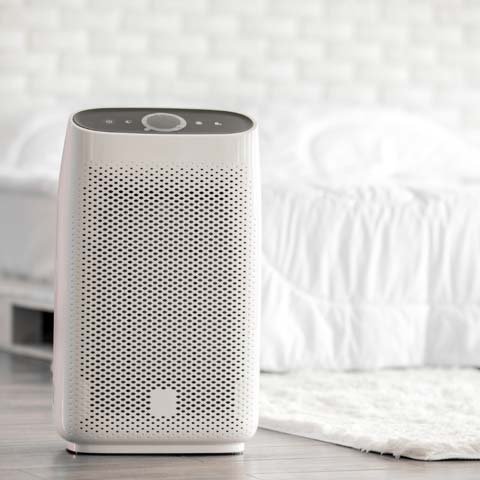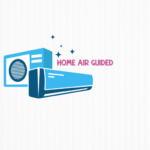If you’ve ever wondered what is a HEPA filter, then this post is for you.
Below, we’ll go over every aspect of HEPA filtration, including what does a HEPA filter do, what are HEPA filters made of, and what is a HEPA air purifier.
This article will explain everything you need to know about HEPA filters so that you can know exactly how it works and why you should use it.

A HEPA filter is a very high efficiency air particulate air filter that can capture ultrafine pollutants. HEPA filters are considered the industry standard for removing dust, pollen, mold, bacteria, particulate matter, and other airborne particles. A HEPA filter is found in air purifiers and forced-air HVAC systems.
There are two common standards for HEPA filters: European and U.S.
In Europe, HEPA filters must remove 99.95% (ISO) of particles that are 0.3 microns in size. In the U.S., HEPA filters must remove 99.97% of particles that are 0.3 microns in sizes.
| Standard | Filtration Rate of MPPS |
|---|---|
| ISO / European (ISO29463 / EN 1822) | ≥ 99.95% at 0.3 microns |
| US Standard (ISET-RP-CC001) | ≥ 99.97% at 0.3 microns |
According to the U.S. Environmental Protection Agency, “The diameter specification of 0.3 microns responds to the worst case; the most penetrating particle size (MPPS). Particles that are larger or smaller are trapped with even higher efficiency. Using the worst-case particle size results in the worst-case efficiency rating (i.e. 99.97% or better for all particle sizes).”
This covers most dust, dander, pollen, mold, and other common allergens that collect in the home, making it the best air filter for allergies.
Now you know what is a HEPA filter, let’s now move on to what are HEPA filters made of.
What are HEPA Filters Made of?
HEPA filters are made from either plastic or fiberglass. A HEPA filter is made up of interlaced fibers with a diameter of less than 1 micron that are twisted and turned in different directions to create a fibrous maze.
The individual threads of the HEPA filter material are so small that a big portion of the media mat consists of air. The openings inside the mat are generally smaller than 0.5 microns, allowing the HEPA material to collect particles down to 0.3 microns in size.
What Does a HEPA Filter Do?

What a This filter does is remove microscopic particles from the air at a very high rate of efficiency. HEPA filters do this by trapping particles through direct impaction, sieving, interception, and diffusion. Using HEPA filtration in homes improves indoor air quality by reducing airborne contaminants.
Direct Impaction
Direct impaction occurs when particles collide directly with a HEPA filter fiber and stick to it.
Sieving
Sieving occurs when particles get trapped between two HEPA fibers because the size of the contaminants is larger than the gap between the fibers.
Interception
Interception occurs when particles stick to the sides of HEPA fibers.
Diffusion
Diffusion occurs when microscopic particles bounce around inside the HEPA filter and eventually get caught by the fibers.
What is the Difference Between a HEPA Filter and a Regular Filter?
The difference between a HEPA filter and a regular filter is that HEPA filters are made of thousands of thin fibers rather than solid material. Regular filters are made of porous materials like cotton and polyester. A HEPA filter can capture finer particles than a regular filter.
So if you were wondering, what do HEPA filters do compared to other types of air filters, then the answer is clear: HEPA filters are much more efficient than regular filters because they can trap particles in a variety of ways through direct impaction, sieving, interception, and diffusion. Regular filters primarily use direct impaction to collect particulates.
What is a True HEPA Filter?
A True HEPA filter is one that has been certified to capture 99.97% of particles down to 0.3 microns in size. HEPA filters come in various types and True HEPA filters meet a strict standard for air filtration.
There are other types of HEPA filters, such as HEPA-type filters, that only have a 99% efficiency rate of capturing particles as small as 2 microns. A True HEPA filter is much better at a 99.97% efficiency rate for particles as small as 0.3 microns.
What is a ULPA Filter?
A ULPA filter or Ultra Low Particulate Air filter has a 99.99% efficiency rate for particles as small as 0.1 microns. ULPA filters were developed for use in hospitals and manufacturing rooms. A ULPA filter is denser than standard HEPA filters, which results in lower airflow and higher power usage for equipment.
What is a HEPA Air Purifier?

A HEPA air purifier is a device that removes microscopic particles from the air. HEPA air purifiers trap dust, pollen, allergens, mold spores, bacteria, pet dander, smoke, particulate matter, and other airborne contaminants so indoor air is healthier to breathe.
HEPA air purifiers are considered to be the best type of air purifier on the market because they have such high efficiency ratings. An air purifier with a True HEPA filter can capture 99.97% of particles down to 0.3 microns. This specification is essential for having the cleanest air possible in a home environment.
You can learn more about what do air purifiers do here or just go ahead and view our list of the top 10 air purifiers to ensure that you get a good HEPA filter. Additionally, if you’re interested in paying the least amount of money for an air cleaner, then you can look at the best budget air purifiers here.
Advantages of a HEPA Air Purifier
- Reduces allergies and asthma symptoms: This dense filter is good at trapping airborne allergens and asthma triggers, which is why it’s always found in the best air purifier for asthmatics.
- Protects human health: There are various types of invisible pollutants in the air that can harm your health. And a HEPA air purifier can work to eliminate those contaminants. This is especially important for babies and young children when is why so many parents choose this type of nursery air purifier for protecting a baby’s health.
- Less dust accumulation: Because particles are trapped inside the HEPA filter, there is no way for dust and other contaminants to re-enter the air space. This can keep a room much cleaner than if an air purifier was not running.
- 100% safe to use: HEPA filter air purifiers produce no by-products. Other types of air purifiers like ionic air purifiers and ozone generators can create harmful toxins in the air that can make you feel sick or cause long-term damage to your health.
Note: It’s easy for people to get confused about the differences between ionizers and air purifiers that use HEPA filters as both units can help wiht indoor air quality. If you want to see a complete comparsion, then check out our air ionizer vs air purifier page for more details.
Disadvantages of a HEPA Air Purifier
- Doesn’t remove all particles: HEPA filter air purifiers are only good for extracting solid particles from the air. These units cannot capture gaseous pollutants or odor-causing molecules. You’ll need a device with an activated carbon filter for that. Also, these types of air purifiers are not the best at removing bacteria and viruses because of their smaller size. A UV air purifier is best for this purpose. See here for details on what does a UV light do on an air purifier.
- Requires filter replacements: Even the best HEPA filter degrades over time as it captures pollutants. Therefore, you need to change the filter when it gets clogged. Smaller HEPA air purifiers may require a replacement every 3 to 6 months while larger units can last 12 months to 2 years before a replacement is needed. However, reusable filter options do exist as we point out in our best air purifier with permanent filter review guide.
- Various levels of HEPA filter quality: Not all air purifiers include the best HEPA filter. HEPA filters come in various quality levels for efficiency. A True HEPA filter is the best type to look for as it removes 99.97% of particles at 0.3 microns in size. A standard HEPA-type filter may only capture 99% at 2 microns in size (much larger).
- Can remove mold spores but not the odor: Similar to our first point, a HEPA filter doesn’t remove odorous particles. This can be a concern for anyone who wants to remediate mold. Check out our best air purifier for mold spores list to find the top units for this purpose.
Summary
We hope you enjoyed this article that answered the question about what is a HEPA filter.
As you learned, HEPA filtration works differently than a standard air filter. What are HEPA filters made of exactly will depend on the manufacturer; however it’s often a form of interwoven plastic or fiberglass fibers
As for what does a HEPA filter do, it works to remove airborne particles so that the air you breathe indoors is cleaner. That’s the basic ideas behind what is a HEPA air purifier as well, except for the fact that HEPA air filter purifiers can only trap solid particles and not gases or chemical vapors.
Hopefully, this guide on HEPA filtration answered all of your questions.
